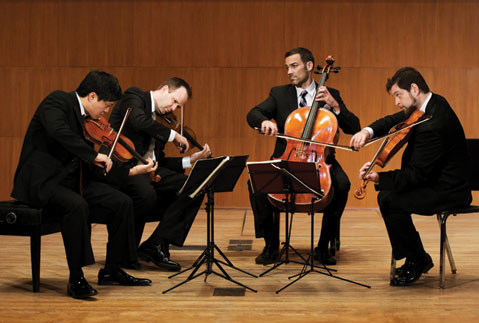Music Academy Preview
Stravinsky and More at the 65th Season of the MAW

“Vision can be a scary thing if you don’t understand the history and the mission of a place,” said Scott Reed, president of Music Academy of the West, when I visited him on the organization’s grounds last week. On the eve of his first full season in charge of Santa Barbara’s highly regarded, internationally acclaimed Music Academy, Reed looks unruffled. Seated in a beautiful drawing room, this young executive radiates the kind of poise that can only come from staying focused on a specific, conscious goal over the long term. “Starting 16 years ago, when I began here as an intern, I made it a point that, whenever I traveled, I would check ahead of time to see if there were any Music Academy alums in the area I was visiting,” Reed told me, explaining his management style and institutional philosophy. “I have been having these lunches and dinners all over the world, and meeting the people who went here or who worked here, for 16 years now, and that’s because from the beginning, I knew that this network of people was the key to the school’s future. I wanted to understand everything — the hopes and dreams, as well as the practical issues of becoming a true 21st-century musician — because the mission of the Music Academy of the West as I see it is to prepare these talented people to meet their futures with confidence.”
It’s a great mission, and thanks to the many generous supporters who have stepped in to help the Music Academy over the past decade, it’s a mission that will soon be fully accomplished. For example, this summer, the new Luria Education Center at the Academy makes its debut. This state-of-the-art complex centers on a gorgeous and comfortable new master-class venue, but it also houses a host of other features, including new individual and ensemble practice rooms, an updated computer network and tech center, a library with both sheet music and listening areas, instrument lockers, two informal student lounges, a catering kitchen, and an enclosed dining pavilion. It stands to make the experience of a summer at the academy much more pleasant and productive for what promises to be the best incoming class of musicians yet. It also includes 11 new Steinway pianos, a major step for the academy toward becoming an all-Steinway institution (with 60 pianos in use, that’s not a small thing). Within the next five years, every aspect of the facility and its programming — from the seats in the auditoriums to the choice of repertoire, visiting artists, and faculty — will have been revisited and, when necessary, revamped. Again, Reed emphasizes the importance of “realistic planning and a responsible process.” He told me, “This is how we have managed to do so much and to do it on schedule and at or under budget.” The Luria Education Center, which is named in honor of philanthropists Leatrice and Eli Luria, cost $10.8 million, all of which was raised either in cash or on short-term pledges, enabling the academy to complete and implement the project with no additional financing costs.
As for the 2012 summer program, it is as ambitious as the physical plant is impressive. Starting on Monday, June 18, with a full complement of master classes and hitting the Granada running on Saturday, June 23, when the Academy Festival Orchestra makes its season debut under the baton of Maestro Larry Rachleff, this will be as robust, thoughtful, and productive a session as has ever been scheduled in the organization’s 65 years of operation.
As befitting a 65th-anniversary year, there are some milestones. Igor Stravinsky’s The Rake’s Progress, scheduled for Friday, August 3, and Sunday, August 5, at the Granada Theatre, will be a brand-new production, for which the academy will construct the sets and sew the costumes. Stage director David Paul comes from Juilliard, and the conductor, Alexander Lazarev, is a bona fide international superstar who received rave reviews when he conducted the production in 2007. The opera is in English, with a libretto by W. H. Auden and his partner Chester Kallman, and in it Stravinsky emphasizes the integral relation between voice and orchestra.
In between, expect a heady mix of familiar favorites and new faces. For instance, pianist Warren Jones returns to conduct his ever-popular vocal master classes and to appear in various ensembles as part of the faculty’s Tuesdays @ 8 concerts. And brilliant pianist Ingrid Fliter will play a guest recital as part of the Mosher Visiting Artist program on Wednesday, July 18.
The scope of the Music Academy today extends well beyond the eight super-intense weeks of the summer season. There are now 30 community organizations using the facilities during the rest of the year, and the school sponsored its first-ever major concert outside of Santa Barbara in March 2012, when the Broad Stage in Santa Monica welcomed a debut recital from the winners of the 2011 Marilyn Horne Song Competition, Karen Vuong and Saule Tlenchiyeva. But the heart of the organization remains where it has been, on a sunny bluff overlooking the Pacific, where this summer, for the 65th time, the world’s top young musicians will play, learn, and dream.



